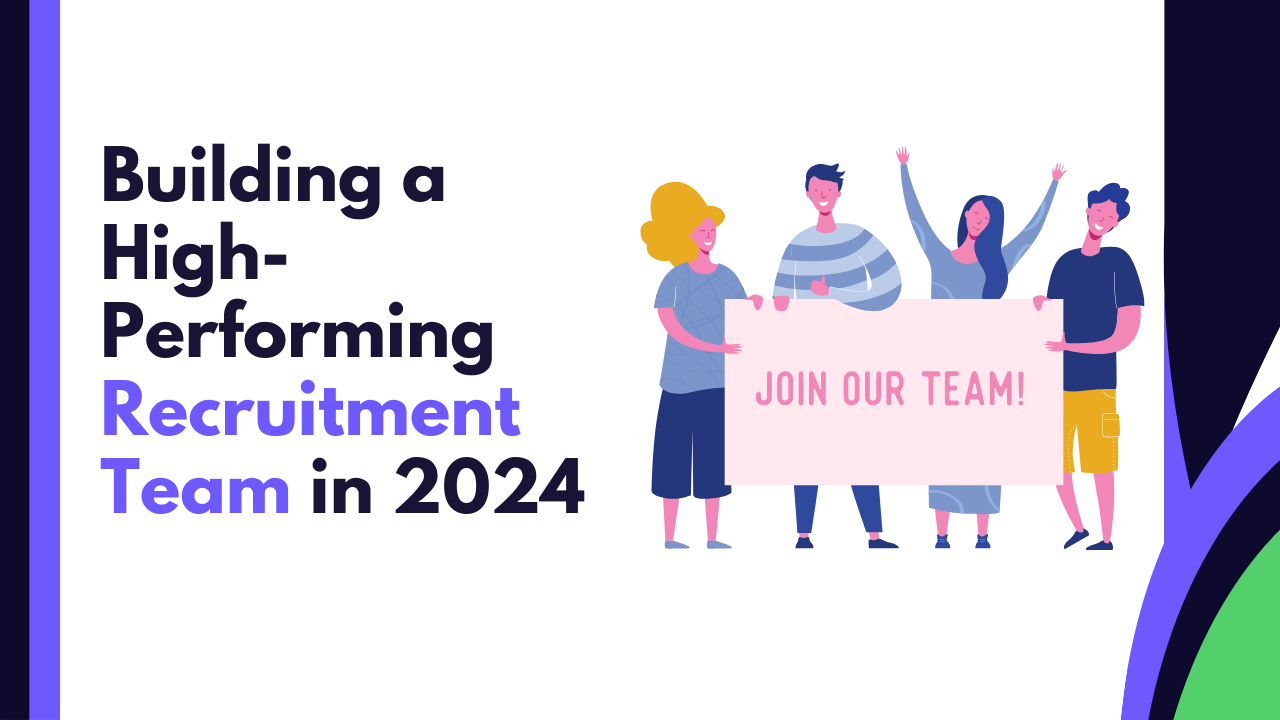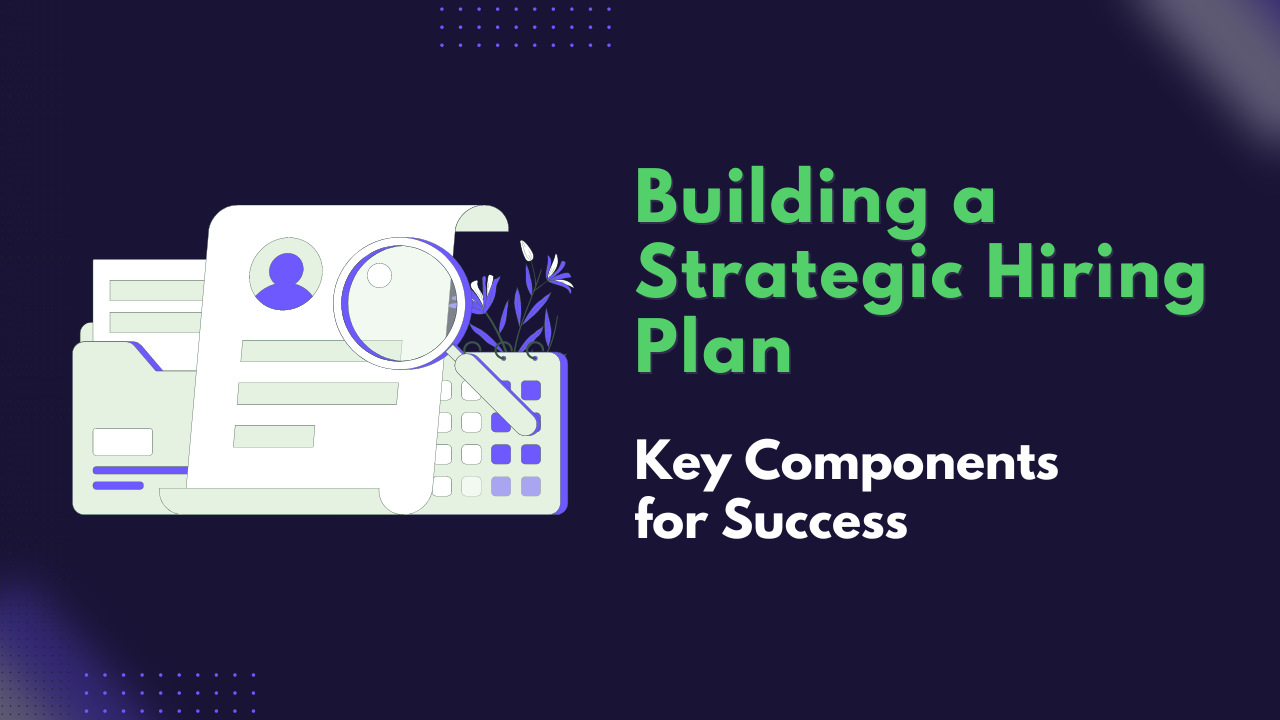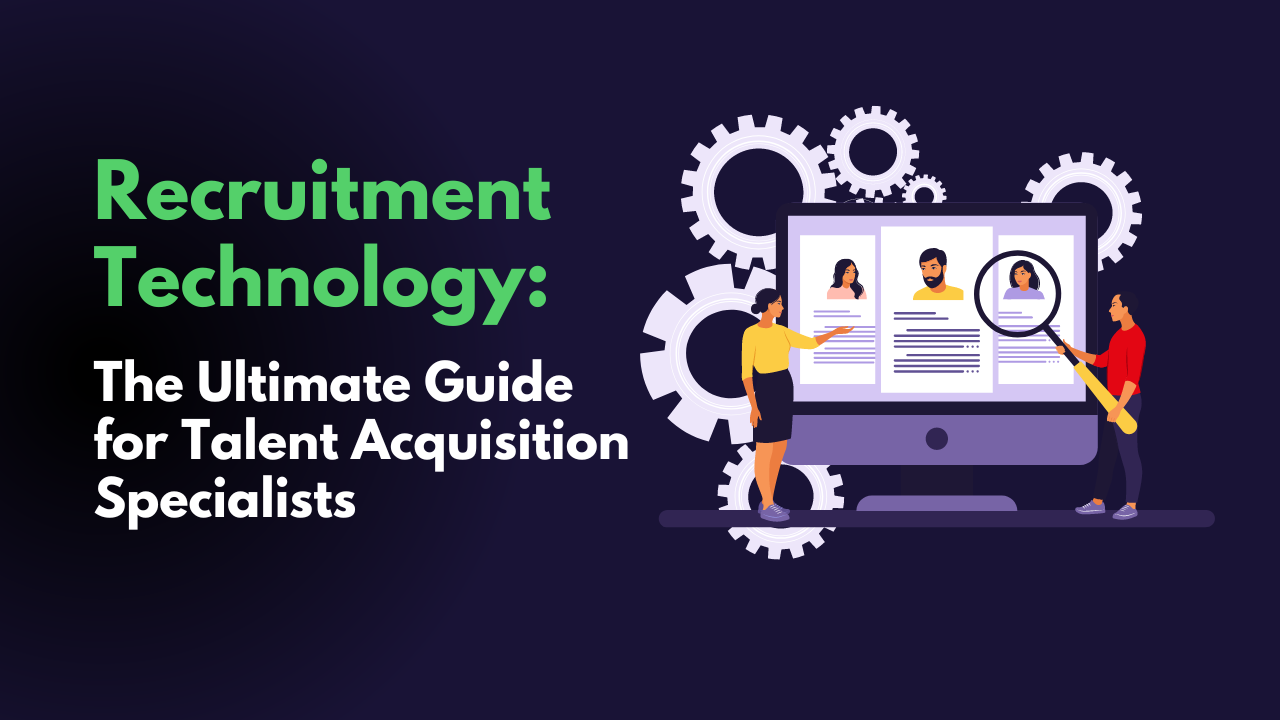The talent acquisition landscape has transformed. In 2024, building a high-performing recruitment team isn’t a luxury—it’s the bedrock of organizational success. In this blog post, we’ll delve into the essential elements of building and nurturing a recruitment team that excels in 2024 and beyond. Specifically, we’ll explore how the role of recruiters is evolving in the age of AI and automation, the core skills needed to thrive, and the strategies for structuring your team for maximum efficiency.
Moreover, from leveraging AI-powered tools like TapTalent to fostering a data-driven hiring approach, we’ll cover everything you need to know to transform your recruitment team into a high-performing engine of talent acquisition. So, get ready to discover the secrets to building a recruitment function that not only keeps pace with the demands of 2024 but also sets the standard for excellence in attracting, engaging, and securing top talent for your organization.
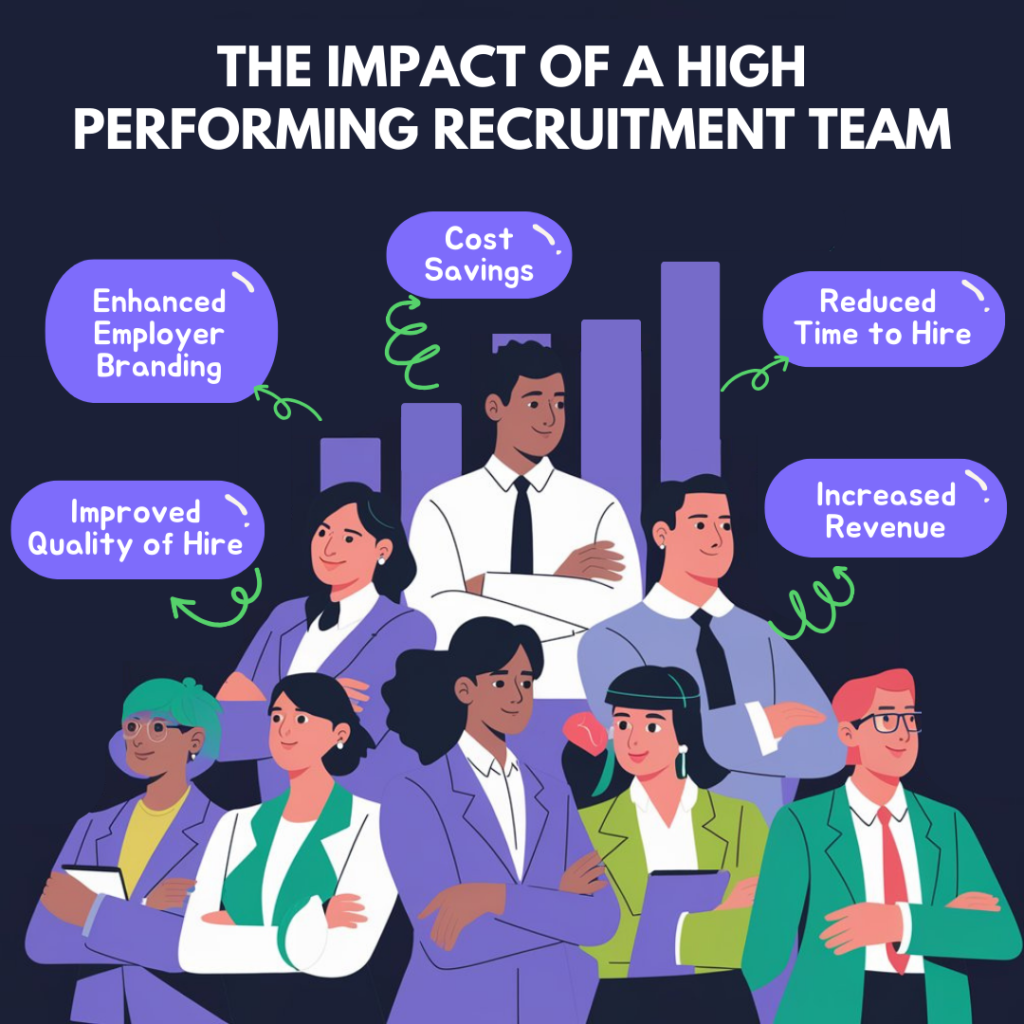
The Evolving Role of Recruiters in 2024
The recruitment game has changed. Forget everything you thought you knew. In today’s cutthroat job market, companies face fierce competition for top talent. The war for talent is real, and the scarcity of skilled professionals means that recruiters are feeling the pressure. The recruitment landscape is constantly shifting, making it more challenging than ever to find and attract the best candidates. Staying ahead of the curve is no longer a luxury—it’s a necessity.
So, what are the key trends shaping the future of recruitment? Let’s take a look:
1. The Rise of AI:
Artificial intelligence is revolutionizing the way companies find and hire talent. AI-powered tools are transforming everything from sourcing and screening candidates to predicting future hiring needs. Imagine being able to instantly analyze thousands of resumes, identify the best-fit candidates, and even predict their likelihood of accepting an offer – that’s the power of AI in recruitment. Platforms like TapTalent are leading the charge, offering AI-driven tools that help companies make smarter hiring decisions.
2. Automation is King:
Repetitive, time-consuming tasks are a thing of the past. Automation is streamlining workflows, freeing up recruiters to focus on what really matters – building relationships and making strategic decisions. TapTalent’s automated outreach campaigns, for example, allow recruiters to connect with a wider pool of candidates without lifting a finger, ensuring no potential star slips through the cracks.
3. Data-Driven Hiring:
Gut feelings are out, data is in. Companies are increasingly relying on data analytics to make informed hiring decisions. By analyzing recruitment metrics, companies can identify bottlenecks, optimize their processes, and improve their chances of finding the perfect candidate.
4. The Remote Revolution:
The rise of remote work has fundamentally changed how we think about work. Companies are no longer limited by geographical boundaries, opening up a world of possibilities when it comes to talent acquisition. TapTalent‘s platform facilitates remote hiring processes, connecting companies with top talent regardless of location.
5. Diversity & Inclusion:
Building diverse and inclusive workplaces is no longer just a nice-to-have; in fact, it’s a business imperative. Consequently, companies are prioritizing D&I initiatives, recognizing that a diverse workforce not only fosters greater innovation but also drives success. Therefore, a strong recruitment team becomes crucial for fostering inclusive hiring practices and building a workplace that truly reflects the diversity of our world.
Furthermore, these trends present both challenges and opportunities for recruiters. As a result, navigating this evolving landscape requires a well-equipped and highly skilled team. Thus, investing in a strong recruitment team is no longer optional; rather, it’s essential for attracting and securing the best talent in today’s competitive market. By embracing technology, leveraging data, and prioritizing diversity and inclusion, high-performing recruitment teams can drive significant ROI for their organizations. In turn, they can reduce time-to-hire, improve the quality of hires, and enhance their employer brand.
Platforms like TapTalent provide the tools and resources needed to empower recruitment teams to thrive in this new era of talent acquisition. Specifically, TapTalent enables companies to streamline their recruitment process, automate tedious tasks, and make data-driven decisions. Ultimately, this leads to better hires and a stronger organization overall.
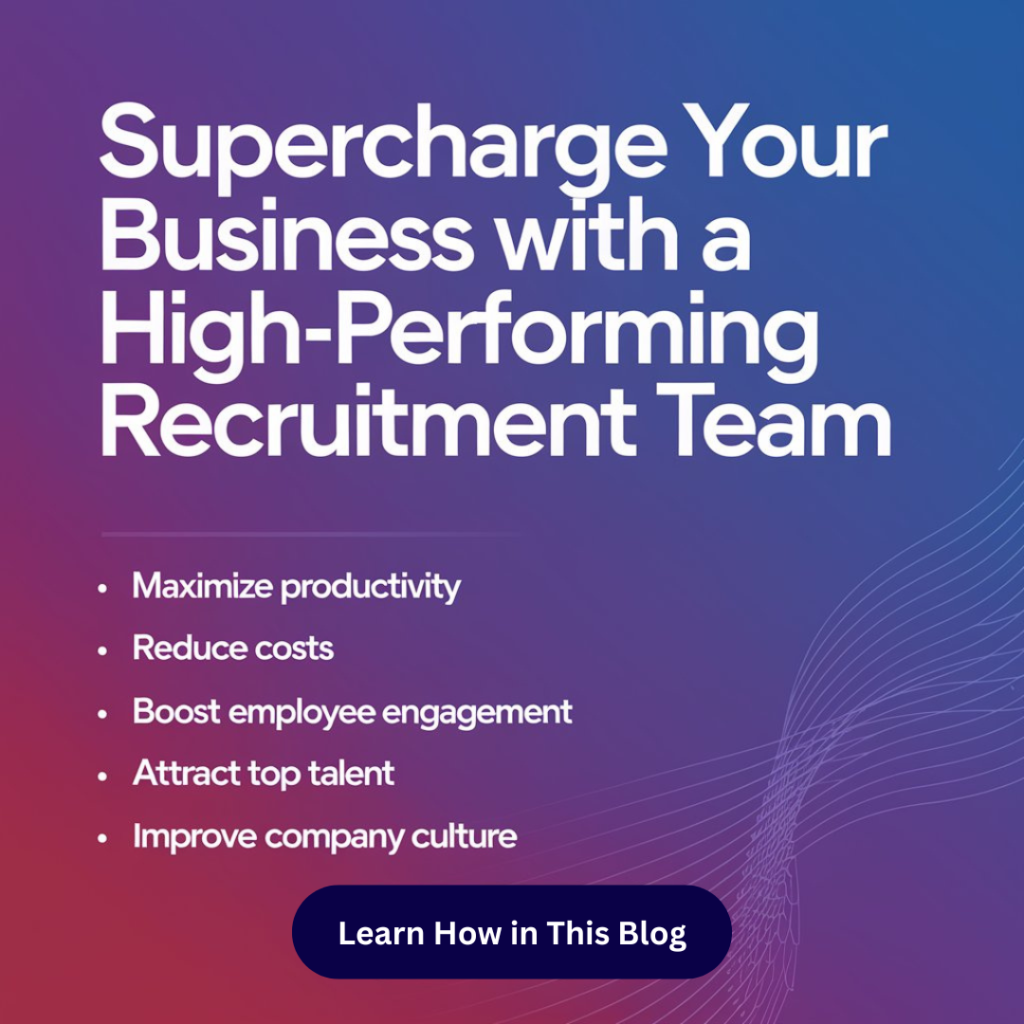
Core Skills of a High-Performing Recruitment Team
In today’s competitive talent market, building a high-performing recruitment team is paramount to any organization’s success. This requires more than just filling positions; it demands a strategic approach that attracts, engages, and secures top talent. A key factor in achieving this lies in the unique skillset of your recruitment team. Let’s delve into the core skills that distinguish exceptional recruiters:
1. Communication: The Foundation of an Efficient Recruitment Team
At the heart of successful recruitment lies strong communication, both written and verbal.
-
- Written Communication: This encompasses crafting compelling job descriptions that attract top talent, writing personalized outreach emails that resonate with candidates, providing constructive feedback, and creating clear reports for stakeholders.
-
- Verbal Communication: This involves conducting engaging phone screens and interviews, effectively presenting offers, handling candidate objections with diplomacy, and building rapport with potential hires.
By mastering both forms of communication, recruiters can ensure they are effectively conveying information, building relationships, and leaving a positive impression on candidates throughout the hiring process.
2. Negotiation: Securing the Best Talent
Negotiation is an art form in recruitment, involving a delicate balance of understanding candidate motivations and achieving mutually beneficial outcomes. Key aspects include:
-
- Salary Negotiation: This requires thorough research of market rates, understanding candidate expectations, presenting compelling offers that align with the company’s budget, and skillfully handling counteroffers.
-
- Benefits Discussions: Clearly explaining company benefits, highlighting their value proposition to candidates, and addressing any concerns transparently is crucial.
-
- Closing Deals: This involves creating a sense of urgency while maintaining enthusiasm, securing commitment from candidates, and managing the onboarding process seamlessly.
Effective negotiation ensures you attract and secure top talent while aligning with your company’s hiring needs and budget considerations.
3. Data Analysis: Embracing Data-Driven Recruitment
The modern recruitment landscape increasingly relies on data-driven decisions, and recruiters need to embrace this analytical approach.
-
- Tracking Key Metrics: This includes monitoring time-to-fill, cost-per-hire, source of hire, offer acceptance rate, and quality of hire, providing valuable insights into the effectiveness of recruitment strategies.
-
- Identifying Trends: Analyzing data helps understand which sourcing channels are most effective, which candidate profiles perform best, and how to improve the overall hiring process continuously.
-
- Optimizing Recruitment Strategies: Data-driven insights are essential for refining job descriptions, targeting strategies, and outreach campaigns. Platforms like TapTalent, with its AI-powered engine, can automate these processes and provide data-backed recommendations, streamlining your efforts and maximizing your ROI.
By leveraging data analysis, recruiters can make informed decisions, optimize their strategies, and demonstrate the value of their work.
4. Tech-Savviness: Navigating the Digital Recruitment Landscape
In today’s digital age, recruiters must be tech-savvy, proficiently navigating various tools and platforms to streamline processes and enhance their reach. Essential tech skills include:
-
- Recruitment CRM/ATS: Mastery of Customer Relationship Management (CRM) systems and Applicant Tracking Systems (ATS) is crucial for managing candidate pipelines, tracking progress, automating communication, and generating reports. TapTalent’s unified smart inbox further streamlines this by centralizing multi-channel communication.
-
- Social Media: Recruiters need to leverage platforms like LinkedIn effectively for sourcing candidates, engaging with potential hires, and building a strong employer brand. TapTalent’s LinkedIn extension allows for seamless profile import and outreach, simplifying your social media recruitment efforts.
-
- Video Conferencing: Conducting virtual interviews, hosting online events, and building rapport with remote candidates are essential skills in today’s geographically diverse talent pool.
By embracing technology, recruiters can optimize their workflows, expand their reach, and engage with candidates more effectively.
5. Relationship Building: The Human Touch in Recruitment
While technology plays a crucial role in recruitment, the importance of human connection remains paramount. Building strong relationships with candidates, hiring managers, and stakeholders is essential for long-term success.
-
- Candidate Relationships: Nurturing relationships with potential hires by providing regular updates, offering career advice, and staying in touch even after the hiring process demonstrates genuine care and strengthens your employer brand.
-
- Hiring Manager Relationships: Understanding the specific needs of hiring managers, providing regular updates on candidate progress, and offering consultative advice ensures alignment and fosters trust.
-
- Stakeholder Relationships: Collaboration with other departments, building strong internal networks, and fostering a positive working environment contribute to a cohesive and successful recruitment process.
By prioritizing relationships, recruiters create a positive experience for everyone involved and build a strong network that benefits both the company and the candidates.
6. Candidate Experience Management: Leaving a Lasting Impression
In today’s candidate-driven market, creating a positive and engaging candidate experience throughout the entire hiring process is not just good practice, it’s essential.
-
- Communication: Timely updates, prompt responses to inquiries, and clear, honest feedback show respect for candidates’ time and efforts.
-
- Transparency: Keeping candidates informed about the hiring process, timelines, and next steps provides clarity and manages expectations effectively.
-
- Feedback: Offering constructive feedback to candidates, even if they are not selected for the position, demonstrates a commitment to their growth and leaves a positive impression.
-
- Follow-up: Staying in touch with candidates, even after the hiring process, builds relationships and positions your company as an employer of choice.
A positive candidate experience enhances your employer brand, attracts top talent, and improves your chances of securing the best candidates.
7. Ongoing Learning and Development: Staying Ahead of the Curve
The recruitment landscape is constantly evolving, with new technologies, changing candidate expectations, and emerging best practices. Therefore, continuous learning and development are essential for recruiters to stay ahead of the curve.
-
- Industry Certifications: Encourage recruiters to pursue relevant certifications, such as Certified Internet Recruiter (CIR) or Professional in Human Resources (PHR), to validate their expertise and enhance their credibility.
-
- Online Courses and Webinars: Leverage readily available online learning platforms and webinars that offer valuable insights into recruitment trends, technologies, and best practices.
-
- Conferences and Networking Events: Attending industry conferences and networking events allows recruiters to stay abreast of the latest developments, learn from experts, and expand their professional network.
By investing in continuous learning, recruiters can enhance their skills, adapt to industry changes, and maintain a competitive edge in the talent market.
By fostering these core skills within your recruitment team, you empower them to attract, engage, and secure the top talent your organization needs to thrive. Remember, a high-performing recruitment team is not just about filling positions, but about strategically building a talented workforce that drives your company’s success.
Structuring Your Ideal Recruitment Team
Building a high-performing recruitment team isn’t just about finding individuals with stellar track records – it’s about creating a cohesive unit where expertise intermingles with seamless collaboration. This synergy is what fuels efficiency, elevates candidate experience, and ultimately drives successful hires. So, what does this dream team look like in 2024? Let’s break down the key roles and why their interconnectedness is vital:
1. Recruiters: The Architects of Talent Acquisition
Recruiters are the backbone of any successful recruitment team. They manage the entire candidate lifecycle – from identifying promising individuals to conducting interviews and negotiating offers. Their deep understanding of the job market, coupled with their ability to assess talent and build strong relationships, ensures that the right candidates are engaged and nurtured throughout the hiring process.
2. Sourcers: The Talent Scouts
In today’s competitive talent landscape, sourcing is a specialized skill set. Sourcers are the eagle-eyed experts who proactively seek out and engage with top talent, often those not actively looking for new opportunities. They leverage a variety of channels – LinkedIn, professional networks, social media, and even AI-powered sourcing tools like TapTalent – to unearth hidden gems and expand the pool of potential candidates.
3. Coordinators: The Orchestrators of Efficiency
Behind every well-structured recruitment process is a skilled coordinator. They ensure seamless communication, schedule interviews, manage candidate information, and handle the often-complex logistics that keep the process moving smoothly. Moreover, their meticulous attention to detail ensures a positive experience for both candidates and the recruitment team.
4. HR Leaders: The Strategic Navigators
HR Leaders provide the strategic direction for the entire recruitment function. They set goals, manage budgets, analyze data to optimize processes, and ensure that recruitment strategies align with overall business objectives. Their leadership and vision are crucial for building a high-performing team that consistently delivers exceptional results.
The Power of Collaboration
Imagine this: your Sourcers, armed with powerful tools like TapTalent, uncover exceptional passive candidates. They seamlessly share these profiles with Recruiters through TapTalent’s unified inbox, sparking a real-time discussion about potential fit. The Coordinator, kept in the loop, promptly schedules interviews, ensuring a swift and positive candidate experience. This, in a nutshell, is the power of collaboration.
When a recruitment team functions as a cohesive unit, sharing information, and supporting each other’s efforts, the results are undeniable. Regular team meetings, shared access to candidate pipelines, and brainstorming sessions for sourcing strategies all contribute to a more efficient, effective, and ultimately, successful recruitment process. Therefore, building a high-performing recruitment team is an investment worth making. By fostering a collaborative environment and leveraging tools like TapTalent, you’re not just filling positions; you’re building the future of your organization.
Tools and Technologies for Enhancing the Efficiency of Recruitment Teams
In today’s digital age, leveraging the right technology is no longer just an advantage; it’s essential for building a high-performing recruitment team. Relying solely on manual processes for tasks like candidate sourcing, communication, and data management is both time-consuming and prone to errors. Consequently, this limits recruiters’ ability to focus on what truly matters: engaging with top talent and building meaningful relationships. Fortunately, the evolution of recruitment technology offers solutions to these challenges.
The Role of Recruitment CRM Systems
Recruitment CRM systems have become indispensable for modern recruiters. A Recruitment CRM is a software solution designed to manage and streamline the entire recruitment process, from sourcing to onboarding. With a centralized candidate database, these systems allow recruiters to access and organize candidate information efficiently. Moreover, automated communication workflows ensure consistent candidate engagement, while enhanced reporting and analytics empower data-driven decision-making. In the end, Recruitment CRMs improve the candidate experience through personalized communication and timely updates.
The Power of Automation Tools for Recruitment Teams
Furthermore, automation tools further amplify recruitment efficiency by alleviating the burden of repetitive administrative tasks. This frees recruiters to focus on more strategic activities. For example, automation can streamline tasks such as sourcing candidates from platforms like LinkedIn and job boards, screening resumes based on predefined criteria, and scheduling interviews. Therefore, by automating these tasks, recruiters can gain valuable time to build relationships and make informed hiring decisions.
The Comprehensive Solution with TapTalent
Platforms like TapTalent are at the forefront of this technological revolution. They offer a comprehensive suite of tools designed to empower modern recruitment teams. With access to a global talent pool of over 800 million professionals, TapTalent opens doors to a wider range of potential candidates. Additionally, the platform’s unified smart inbox integrates email, LinkedIn, and WhatsApp interactions, ensuring that no message goes unnoticed.
Embracing Technology for Recruitment Success
By embracing these technological advancements, recruitment teams can streamline their processes and create a more engaging and positive candidate experience. Ultimately, this contributes to the overall success of the organization.
Conclusion
In conclusion, the evolving landscape of talent acquisition requires a dynamic and strategic approach to building a high-performing recruitment team. By fostering a blend of essential skills, establishing a clear team structure, and leveraging innovative technology like TapTalent, businesses can navigate the complexities of the modern job market.
Start optimizing your recruitment process today by evaluating your team’s current skill sets and identifying areas for improvement. TapTalent’s AI-powered platform, featuring a global talent pool of 800 million+ professionals, automated outreach campaigns, and AI-driven testing, provides the tools you need to build a world-class recruitment team.
Ready to revolutionize your hiring process? Visit taptalent.ai and discover how our solutions can empower your team to secure top talent and drive success.
- company culture
- Recruitment
- recruitment team
- Recruitment Technology
- Talent Acquisition
